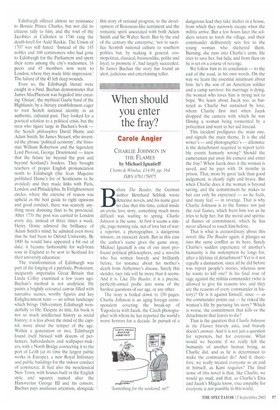When should you enter the fray?
Carole Angier
CHARLIE JOHNSON IN THE FLAMES by Michael Ignatieff Chatto& Windus, 414.99, pp. 164 ISBN 0701176075 Before The Reader, the German author Bernhard Schlink wrote detective novels, and his name gave no clue that this time, coiled inside an erotic love story, something much more difficult was waiting to spring. Charlie Johnson is the same. At first it seems a simple, page-turning tale, not of love but of war: a reporter, a photographer, a dangerous mission, an innocent death. But in this case the author's name gives the game away. Michael Ignatieff is one of our most profound political philosophers, and a novelist who has written bravely and brilliantly before, for instance about his mother's death from Alzheimer's disease. Surely this slender, racy tale will be more than it seems. And it is, Like The Reader, it is a precise, perfectly-aimed probe into some of the hardest questions of our age, or any other.
The story is boiled down to 150 pages. Charlie Johnson is an aging foreign correspondent covering the break-up of Yugoslavia with Jacek. the Czech photographer with whom he has reported the world's worst horrors for a decade. In pursuit of a dangerous lead they take shelter in a house, from which they narrowly escape when the militia arrive. But a few hours later the soldiers return to torch the village, and their commander deliberately sets fire to the young woman who sheltered them. Burning, she runs into Charlie's arms. He tries to save her, but fails; and from then on he is set on a course of revenge.
We follow him to its conclusion — to the end of the road, in his own words. On the way we learn the essential minimum about him: he's the son of an American soldier and a camp survivor: his marriage is dying, the woman who loves him is trying not to hope. We learn about Jacek too, as battered as Charlie but sustained by love, whom Charlie first met when Jacek dropped the camera with which he was filming a woman being tormented by a policeman and went to her aid instead.
This incident prefigures the main one, and signals the main theme. It is the old writer's — and photographer's — dilemma: is the detachment required to report terrible events humanly wrong? Should the cameraman put away his camera and enter the fray? When Jacek does it the woman is saved, and he pays with 18 months in prison. That, more by good luck than good judgement, is clearly right and brave. But when Charlie does it the woman is beyond saving, and the commitment he makes to her can only be expressed — so he feels, and many feel — in revenge. That is why Charlie Johnson is in the flames: not just the real flames, which burn him too as he tries to help her, but the moral and spiritual flames of commitment, which he has never allowed to touch him before.
That is what is extraordinary about this novel: like The Reader again, it plunges us into the same conflict as its hero. Surely Charlie's sudden experience of another's humanity is the redemption he longs for, after a lifetime of detachment? Yet is it not equally a damnation, since all he did before was report people's stories, whereas now he wants to kill one? Is his final roar of rage against the militia commander (who is allowed to give his reasons too, and they are the reasons of every commander in history)? Or is it against himself, since — as the commander points out — he risked the woman's life by pursuing his story? Which is worse, the commitment that kills or the detachment that leaves to die?
That is the question that Charlie Johnson in the Flames bravely asks, and bravely doesn't answer. And it is not just a question for reporters, but for everyone. What would we become if we really felt the humanity of another human being, as Charlie did, and as he is determined to make the commander do? And if, therefore, we really treated everyone as an end in himself, as Kant requires? The final sense of this novel is that, like Charlie, we would go mad; and that, as Charlie's Etta and Jacek's Magda know, true empathy for everyone is not possible in this world.


























































































 Previous page
Previous page